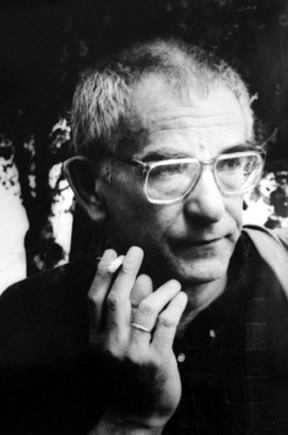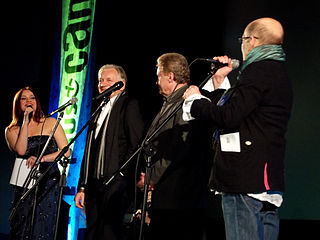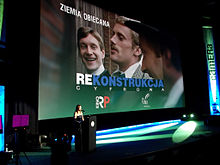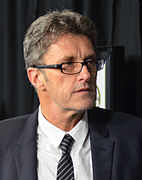
Andrzej Witold Wajda was a Polish film and theatre director. Recipient of an Honorary Oscar, the Palme d'Or, as well as Honorary Golden Lion and Honorary Golden Bear Awards, he was a prominent member of the "Polish Film School". He was known especially for his trilogy of war films consisting of A Generation (1955), Kanał (1957) and Ashes and Diamonds (1958).

Krzysztof Kieślowski was a Polish film director and screenwriter. He is known internationally for Dekalog (1989), The Double Life of Veronique (1991), and the Three Colours trilogy (1993 –1994). Kieślowski received numerous awards during his career, including the Cannes Film Festival Jury Prize (1988), FIPRESCI Prize, and Prize of the Ecumenical Jury (1991); the Venice Film Festival FIPRESCI Prize (1989), Golden Lion (1993), and OCIC Award (1993); and the Berlin International Film Festival Silver Bear (1994). In 1995, he received Academy Award nominations for Best Director and Best Original Screenplay.

Jerzy Oskar Stuhr is a Polish film and theatre actor. He is one of the most popular, influential and versatile Polish actors. He also works as a screenwriter, film director and drama professor. He served as the Rector of the Ludwik Solski Academy for the Dramatic Arts in Kraków for two terms: from 1990 to 1996 and again from 2002 to 2008.

Jerzy Skolimowski is a Polish film director, screenwriter, dramatist, actor and painter. Beginning as a screenwriter for Andrzej Wajda's Innocent Sorcerers (1960), Skolimowski has made more than twenty films since his directorial debut The Menacing Eye (1960). In 1967 he was awarded the Golden Bear prize for his Belgian film The Departure (1967). Among his other notable films is Deep End (1970), starring Jane Asher and John Moulder Brown.

The Leon Schiller Polish National Film, Television and Theatre School in Łódź, commonly known as Łódź Film School is a Polish academy for future actors, directors, photographers, camera operators and television staff. It was founded on 8 March 1948 in Łódź (Lodz).

Ashes and Diamonds is a 1958 Polish drama film directed by Andrzej Wajda, based on the 1948 novel by Polish writer Jerzy Andrzejewski. Starring Zbigniew Cybulski and Ewa Krzyżewska, it completed Wajda's war films trilogy, following A Generation (1954) and Kanal (1956). The action of Ashes and Diamonds takes place in 1945, shortly after World War II. The main protagonist of the film, former Home Army soldier Maciek Chełmicki, is acting in the anti-Communist underground. Maciek receives an order to kill Szczuka, the local secretary of the Polish Workers' Party. Over time, Chełmicki increasingly doubts if his task is worth doing.
Paweł Jan Mykietyn is a Polish award-winning composer and clarinetist.

A Short Film About Killing is a 1988 drama film directed by Krzysztof Kieślowski and starring Mirosław Baka, Krzysztof Globisz, and Jan Tesarz. Written by Krzysztof Kieślowski and Krzysztof Piesiewicz, the film was expanded from Dekalog: Five of the Polish television series Dekalog. Set in Warsaw, Poland, the film compares the senseless, violent murder of an individual to the cold, calculated execution by the state. A Short Film About Killing won both the Jury Prize and the FIPRESCI Prize at the 1988 Cannes Film Festival, as well as the European Film Award for Best Film.

Polish Film Award, or Eagle is the national film award of Poland. It has been delivered annually since 1999, with the first event held on 21 June, by the National Chamber of Audiovisual Producers (KIPA). Since 2003 they have been awarded by the Polish Film Academy.
The 2003 Polish Film Awards ran on March 15, 2003. It was the 5th edition of Polish Film Awards: Eagles.

The Polish Academy Life Achievement Award is an honorary Polish Film Award bestowed by the Polish Film Academy for outstanding contributions to the cinema of Poland.
With the fall of communism Polish culture and society began a process of profound transformation, marked by the return of democracy and redevelopment of civil society. After 1989, the heavy government controls ended, and the radical economic changes were introduced. The influx of new aesthetic and social ideas was accompanied by the Western market forces. However, unlike any other temporal marker in the development of Polish culture from the past, the year 1989 did not introduce any specific literary events or artistic manifestations. For a generation of accomplished writers the objectives and their moral quests remained the same as in the preceding period. The first decade of freedom brought mainly state reforms in the financing of cultural institutions and patronage; forcing self-sustainability in an often uncharted territory. Literature, film, visual arts, theater and mass media remained focused on their active participation in public life.

Innocent Sorcerers is a 1960 Polish psychological romantic drama film directed by Andrzej Wajda, and starring Tadeusz Łomnicki and Krystyna Stypułkowska. Its plot follows a young womanizer meeting another yet finally interesting girl, who all but forces herself into his apartment where they play the game of appearances, unable to confess their love to each other.

The Gdynia Film Festival is an annual film festival first held in Gdańsk (1974–1986), now held in Gdynia, Poland.

Małgorzata Szumowska is a Polish film director, screenwriter and producer, born in Kraków.

International Festival of Independent Cinema Off Camera is a film festival held in Kraków, Poland, with up to 400 screenings annually, seminars, international stars, guests and jury. It is the first event of its kind in the country based on creative dialog between world experts representing other independent film competitions such as the Sundance Film Festival and CineVegas, as well as festivals in Bangkok, Berlin, Buenos Aires, Busan, Dubai, Kolkata, Los Angeles, Reykjavík, Rotterdam, Toronto, and Venice. It is a festival of festivals with official backing from the City of Kraków with dozens of international sponsors and prominent partners including Poland's Ministry of Culture and National Heritage, Lufthansa, Mercedes-Benz and Sony. In 2008–2014 the official name was "Off Plus Camera", since 2015 it is "PKO Off Camera".
Ryszard Lenczewski is a Polish film and television cinematographer with more than thirty feature film credits. Lenczewski has been the cinematographer for four of director Paweł Pawlikowski's feature films. His work on Pawlikowski's Ida (2014) has been widely recognized, garnering nominations for both the Academy Award and the BAFTA Award.
The Polish Film Academy is a professional honorary organization dedicated to the advancement of the arts and sciences of motion pictures.

The Krzysztof Kieślowski Film School is a Polish film and television school established in 1978 and based in Katowice, Poland. It is a full-time film school and offers MA courses in Directing, Cinematography and Photography, Film and Television Producing. Kieślowski Film School is allowed to award PhD degree. One of its first tutors was Krzysztof Kieślowski. It is a part of University of Silesia.
The cinema of moral anxiety, Polish: Kino moralnego niepokoju, was a short-lived (1976–1981) but influential movement in the history of the cinema of Poland. The term was also translated as "cinema of moral unrest", "cinema of moral concern", "cinema of moral dissent". Films of this movement portrayed the crisis of the regime in Communist Poland, usually in the setting of a provincial town. The development of the movement was abruptly stopped by the introduction of the martial law in Poland in 1981, and when it was lifted, the country was overwhelmed with powerful political and social processes which had eventually led to the fall of Communism in the country and disappearance of the addressed social issues.


































